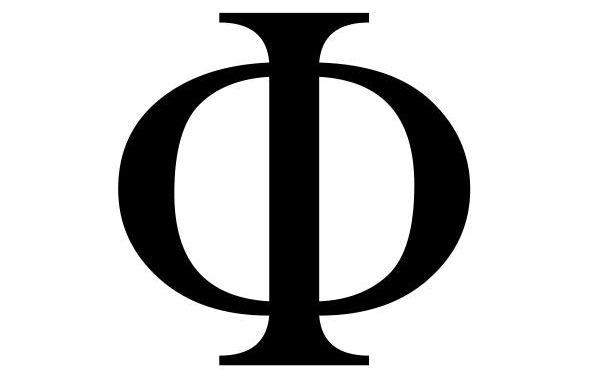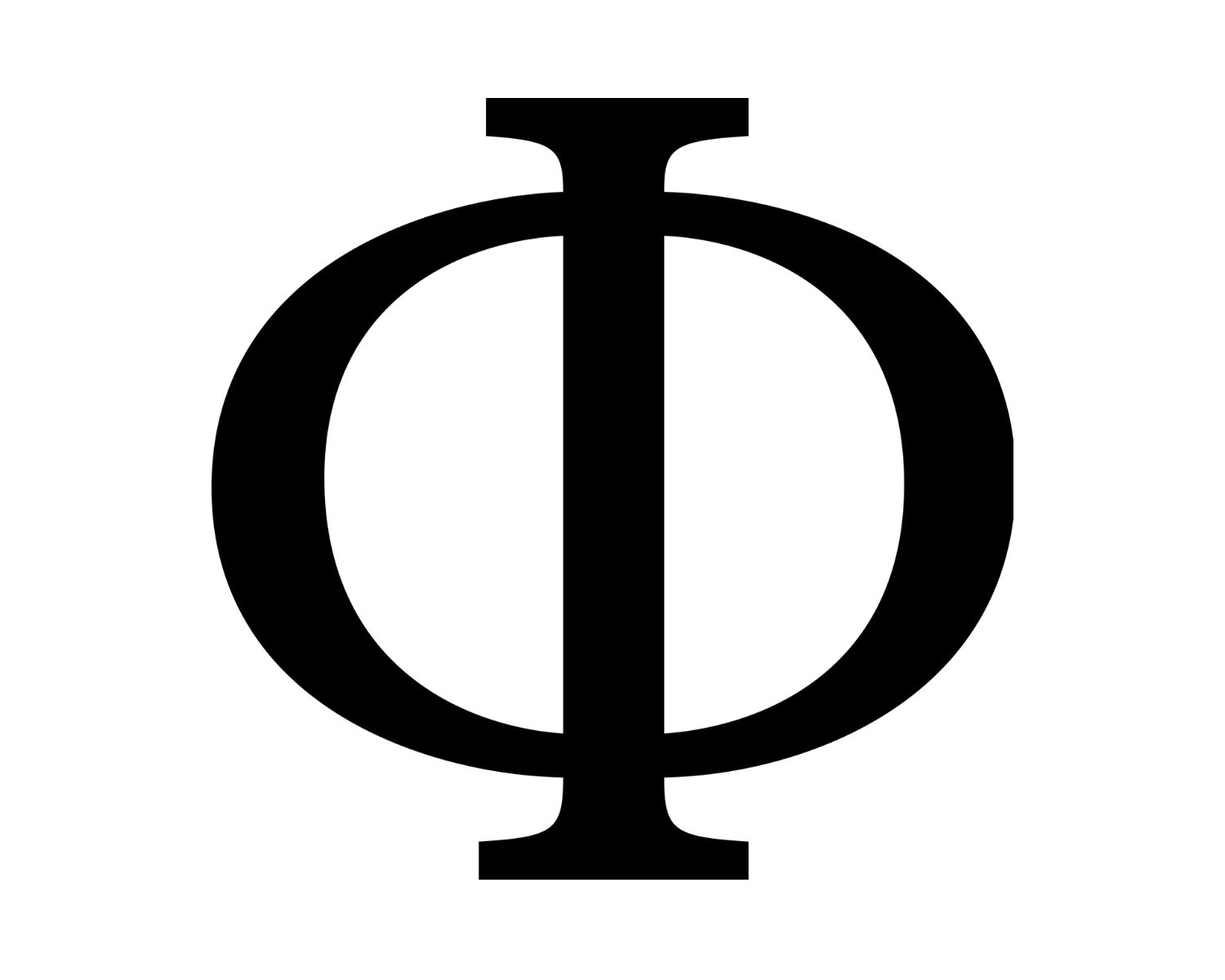Phi Mu Georgia Tech - Exploring Data And Symbols
Sometimes, the simple sound of a word can bring to mind a whole collection of ideas, and that's certainly the case when we think about "phi." It's a term that pops up in quite a few different places, and each appearance brings with it a unique set of meanings. From important rules about personal information to fascinating mathematical concepts and even the letters of an ancient alphabet, the idea of "phi" really spans a wide range of topics. It's a word that, in a way, invites us to look a little closer at the details that make up our world, whether those details are about keeping private things safe or figuring out how numbers work.
You know, it's pretty interesting how one short word can hold so much significance, isn't it? We might hear it in one context and then, just like that, discover it means something completely different somewhere else. This idea of "phi" is a good example of how language can be quite layered, with various definitions sitting comfortably side by side. It really shows us how much there is to discover when we take a moment to explore the different ways words are used and what they stand for in different fields of study, perhaps even in an academic setting like Georgia Tech.
So, we're going to take a bit of a closer look at these different facets of "phi," exploring what it means in terms of protecting personal details, how it fits into the Greek alphabet, and even its rather unusual place in mathematics. It's almost like piecing together a puzzle, where each piece, while distinct, adds to a fuller picture of how this simple term plays a part in our daily lives and in the broader world of knowledge. This journey will help us get a better grasp on a concept that, in some respects, is more widespread than you might first imagine.
- %D9%83%D9%85 %D8%A7%D9%84%D9%85%D8%B3%D8%A7%D9%81%D8%A9 %D8%A8%D9%8A%D9%86 %D8%A7%D9%8A%D8%B1%D8%A7%D9%86 %D9%88%D8%A7%D8%B3%D8%B1%D8%A7%D8%A6%D9%8A%D9%84
- Riley Green Political Party
- Is Emily Compagno Married
- 2 Babies One Fox
- Agentredgirl
Table of Contents
- What Does PHI Stand For? Keeping Personal Health Details Safe
- Why Is PHI Important for Everyone, Including Those at Georgia Tech?
- How Does HIPAA Help Protect PHI in a Georgia Tech Context?
- Exploring the Greek Letter Phi and its Meaning at Georgia Tech
- What is the Golden Ratio Phi, and Why Does it Matter Academically?
- Understanding Data Access for PHI: A Look for the Georgia Tech Community
- Permission and Revocation: Your Say Over PHI, Even Near Georgia Tech
- A Summary of Phi's Many Forms
What Does PHI Stand For? Keeping Personal Health Details Safe
When people talk about "PHI," they are usually referring to "protected health information," and this is a really big deal in the world of personal privacy. This term describes any piece of information about your health, your medical care, or even how you pay for that care, that could possibly point back to you as an individual. It’s like a collection of all those personal health records that hospitals, clinics, and even your doctor’s office might keep. So, it's not just your diagnosis, but also things like your name, address, birth date, and anything else that, when combined with health details, could identify you specifically. It's very much about making sure your private medical story stays just that: private.
The HIPAA Privacy Rule, which is a set of federal guidelines, gives people a lot of power over their own health information. This rule puts in place certain safeguards for all those personal health details that are held by organizations that handle medical records. It’s designed to give individuals a say in how their information is used and shared, which is pretty important when you think about it. Basically, it’s all about making sure you have rights regarding your own medical data, and that these rights are honored. This rule, in some respects, sets the standard for how medical information should be treated.
It's interesting to note that the definition of "protected health information" is quite broad. It covers anything that can identify a person and relates to their past, present, or future physical or mental health, the provision of health care to the person, or the past, present, or future payment for the provision of health care to the person. This means that if any piece of information, when put together with other facts, could reveal who you are, it falls under this protective umbrella. So, it’s a pretty comprehensive approach to safeguarding sensitive personal data, and that’s a good thing, really.
- Iran President Vs Supreme Leader
- Discovering The Multitalented Max Minghella An Artistic Journey
- Aishah Sofey Only Leak
- Snow Bunny Girl Meaning
- From Champion To Inspiration Ronnie Coleman Now
Why Is PHI Important for Everyone, Including Those at Georgia Tech?
The importance of keeping PHI safe really cannot be overstated, especially when you think about how much information is shared in our modern world. Just like other personal details, health information is something people generally want to keep to themselves. It’s a very private part of life, and when it’s not kept secure, it can lead to a lot of worry and even harm. Imagine if your medical history or details about a sensitive condition became public knowledge without your permission; that could cause a lot of distress, couldn't it?
For places like Georgia Tech, where there are many students, faculty, and staff, the principles behind PHI are particularly relevant. People in any large community, including those associated with Georgia Tech, expect their health details to be handled with care and respect. If a health service on campus, for instance, were to mishandle someone's PHI, it could have serious consequences for the individual and for the trust people place in that institution. So, it's not just about following rules; it's about building and keeping trust within a community, which is pretty essential.
The rising number of data breaches, where protected health information is accidentally or intentionally exposed, is a very real concern for healthcare providers and individuals alike. It really doesn't matter if an organization is big or small; the risk of a data breach is always there. This makes the need for strong protections even more pressing. Everyone, from the people providing care to those receiving it, has a part to play in making sure these sensitive details are kept out of the wrong hands. It's a bit like a shared responsibility, you know?
How Does HIPAA Help Protect PHI in a Georgia Tech Context?
The Health Insurance Portability and Accountability Act of 1996, often called HIPAA, is a big part of how protected health information is managed in the United States. It sets out specific rules for how certain organizations, known as "covered entities," must handle personal health details. These rules cover everything from who can see your information to how it should be stored and transmitted securely. It's basically a framework designed to make sure your health data is treated with the care it deserves, which is pretty reassuring.
Under HIPAA, PHI is considered to be an individual’s health, treatment, and payment information, along with any other information kept in the same records that could identify them. This means a lot of different pieces of data fall under its protection. The security rule within HIPAA, for example, explains how electronic PHI should be protected, requiring administrative, physical, and technical safeguards. This is particularly relevant for any health services or research groups that might be connected to Georgia Tech, as they would need to follow these strict guidelines to keep information safe. So, it's quite a comprehensive set of regulations.
HIPAA also gives people clear rights about their health information. For instance, you have the right to get a copy of your medical records, to ask for corrections if you find something wrong, and to know who has seen your information. These rights are fundamental to giving individuals control over their own data. For students or staff at Georgia Tech using campus health services, understanding these rights means they can feel more confident that their personal health stories are being looked after properly. It's really about empowering individuals, isn't it?
Exploring the Greek Letter Phi and its Meaning at Georgia Tech
Beyond its meaning in healthcare, "Phi" also refers to the 21st letter of the Greek alphabet. It's written as an uppercase Phi (Φ) or a lowercase phi (φ or ϕ). This letter has a long history and has been used for various purposes over centuries. For instance, in ancient Greek, it was used to represent a "ph" sound, which later changed to an "f" sound around the first century AD. It's interesting how language and pronunciation can evolve over time, isn't it? This historical shift is just one small piece of the rich story behind this particular letter.
The Greek alphabet, including Phi, plays a significant role in many academic fields, particularly in places where science, mathematics, and engineering are central, much like at Georgia Tech. You might see the letter Phi used in physics equations, mathematical formulas, or even in the names of student organizations that draw inspiration from Greek traditions. It's a symbol that carries a lot of weight in academic and scientific circles, representing various concepts depending on the context. So, its presence in these fields is quite widespread, really.
In the system of traditional Greek numerals, Phi also had a numerical value. It was used to represent 500 (φʹ) or 500,000 (͵φ). This shows how versatile ancient writing systems could be, using letters not just for sounds but also for numbers. This kind of historical detail can be quite fascinating for anyone interested in the origins of symbols and their varied uses across different eras and disciplines. It's a bit like discovering a hidden layer of meaning, you know?
What is the Golden Ratio Phi, and Why Does it Matter Academically?
And then there's another "Phi," the one that represents a very special irrational number, often called the Golden Ratio. This mathematical Phi, symbolized as φ, has a value of approximately 1.618033988749895… It's an irrational number, which means its decimal representation goes on forever without repeating, much like pi (π = 3.14159265358979…). It's pretty amazing to think about numbers that never truly end, isn't it?
The Golden Ratio is famous for its unusual mathematical properties and its appearance in many different areas, including geometry, art, architecture, and even nature. It’s found in the spirals of seashells, the arrangement of leaves on a stem, and even in the proportions of some human bodies. Its presence in so many seemingly unrelated places has led some to believe it represents a fundamental principle of beauty and balance. For students and researchers at a place like Georgia Tech, where mathematical principles are applied to real-world problems, understanding concepts like the Golden Ratio can open up new ways of looking at design and natural systems. It's a concept that, in some respects, bridges many different fields.
The study of such numbers, like Phi and Pi, is a core part of mathematics and helps us understand the underlying structures of the universe. These numbers are not just abstract concepts; they have real-world implications and applications. They challenge our thinking and push the boundaries of what we understand about patterns and relationships. So, exploring the Golden Ratio Phi is not just an academic exercise; it's a way to appreciate the elegance and mystery of numbers, which is quite a compelling pursuit, really.
Understanding Data Access for PHI: A Look for the Georgia Tech Community
When it comes to using protected health information, there are very clear rules about who can access it and for what reasons. Organizations that handle PHI, like hospitals or clinics, must have policies and procedures in place that spell out exactly which people, or groups of people, within their operations need to see this information to do their jobs. It’s not a free-for-all; access is strictly controlled and limited to those with a legitimate need. This ensures that personal health details are only viewed by authorized personnel, which is a pretty important safeguard.
For example, a doctor needs to see your medical history to provide proper treatment, and a billing specialist needs access to payment information to process your bills. However, someone working in the hospital cafeteria, for instance, would generally not need to see patient health records. These policies are designed to create a clear boundary around sensitive data, making sure that only those directly involved in your care or related administrative tasks can view your PHI. This level of control is essential for maintaining privacy and preventing unauthorized disclosure, you know?
This principle of "minimum necessary" access means that even when someone has a legitimate need to see PHI, they should only be given access to the specific information required for their task, and nothing more. This is a key part of the HIPAA Security Rule and helps to reduce the risk of accidental exposure. For any health-related services or research initiatives connected to Georgia Tech, adopting these practices would be absolutely vital to protect the privacy of individuals and maintain trust within the community. So, it's about being very precise with data access.
Permission and Revocation: Your Say Over PHI, Even Near Georgia Tech
Your ability to control your own protected health information is a cornerstone of privacy regulations. The guidance around using or disclosing PHI for future research, for instance, clearly explains the requirements for getting your authorization. This means that if your health data is going to be used for studies, you have to give your explicit permission first. It's not something that can just happen without your knowledge or agreement. This puts the power firmly in your hands, which is pretty significant.
Beyond giving permission, individuals also have the right to change their minds and revoke their authorization. If you initially agreed to have your PHI used for a certain purpose, but later decide you no longer want it to be, you can withdraw that permission. This right to revoke is a very important aspect of patient autonomy, ensuring that your choices about your health data are respected over time. It means you retain control, even after an initial decision, which is quite empowering.
This flexibility is crucial for maintaining trust between individuals and healthcare providers or researchers. It allows people to feel more comfortable sharing their information, knowing they have the ability to pull back that permission if circumstances change or if they simply have second thoughts. For anyone associated with Georgia Tech, whether as a patient at a campus clinic or a participant in a study, understanding these rights to authorize and revoke is fundamental to feeling secure about their personal health information. It’s basically about having a say in your own data story, and that’s a good thing, really.
A Summary of Phi's Many Forms
So, as we've explored, the term "Phi" is actually quite a multifaceted concept, holding different meanings across various fields. We've seen how it stands for "protected health information," a critical area of privacy that ensures your medical details are kept safe and sound. This involves strict rules like HIPAA, which gives you rights over your own data, including who can see it and for what purposes. It's about safeguarding sensitive personal stories in a world where data breaches are a constant worry, which is pretty important for everyone, including those within the Georgia Tech community.
Then, there's "Phi" as the 21st letter of the Greek alphabet, a symbol with a rich history and a continued presence in academic and scientific pursuits. Its use in mathematics, like the Golden Ratio, reveals a deeper connection to patterns found in nature and art, highlighting its unusual and beautiful properties. This mathematical "Phi" is an irrational number that sparks curiosity and helps us understand the underlying structures of the world around us. It's a concept that, in a way, bridges the abstract with the tangible.
From the careful handling of personal health records to the ancient origins of a letter and the captivating elegance of a mathematical constant, "Phi" truly covers a broad spectrum of knowledge. It reminds us that seemingly simple words can carry immense weight and varied significance depending on the context. This exploration of "Phi" shows us how interconnected different areas of study can be, and how a single term can spark conversations about privacy, history, and the very fabric of the universe. It's pretty fascinating to consider, isn't it?
- Two Babies One Fox X
- Iran Economy 2024
- %D9%83%D9%85 %D8%A7%D9%84%D9%85%D8%B3%D8%A7%D9%81%D8%A9 %D8%A8%D9%8A%D9%86 %D8%A7%D9%8A%D8%B1%D8%A7%D9%86 %D9%88%D8%A7%D8%B3%D8%B1%D8%A7%D8%A6%D9%8A%D9%84
- Qatar Airways Iran Flights
- Aishah Sofey Content

Java : Understanding The Golden Ration Phi | by A Passionate Programmer

11 Facts About Phi - Facts.net

Greek alphabet, letters and symbol